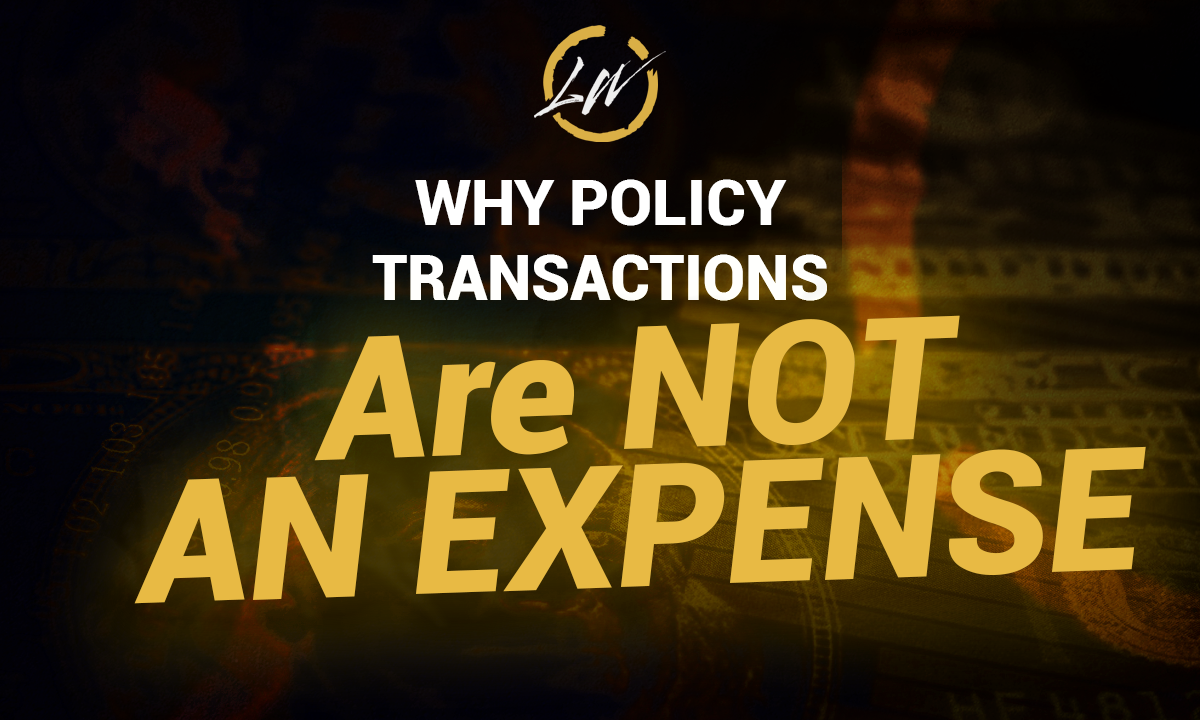Whether you’re investigating how to be your own bank with life insurance for the first time or have been practicing the infinite banking concept for years, you might be struggling to classify your policy transactions, like premiums or loan repayments, correctly. That’s why in this comprehensive guide we’ll walk you through the fundamentals of financial statements, balance sheets and their role in Infinite Banking, to clear up all your questions and make sure you’re not misclassifying your transactions.
I. Balance Sheets and Income Statements
Definitions, Purpose & Differences:
Balance sheets and income statements are two important documents that help us understand how well a person or a business is doing financially. A balance sheet is like a snapshot of someone’s financial situation at a specific time. It shows what they own, what they owe, and how much their stuff is worth. The three main parts of a balance sheet are assets, liabilities, and owner’s equity. Assets are the things they own, like money, property, or investments. Liabilities are what they owe, like loans or bills. Owner’s equity is how much the person or business is worth after subtracting what they owe from what they own. By looking at these parts, people can see how financially stable they are and decide how to manage their money and debts better.
On the other hand, an income statement is like a report card for someone’s finances over a period, like a month or a year. It tells us how much money they made, how much they spent, and if they have any money left over. The three main parts of an income statement are revenues, expenses, and net income. Revenue is the money they made from selling stuff or providing services. Expenses are the costs they had to pay for things like supplies, salaries, or rent. Net income is what’s left after subtracting expenses from revenues, showing how much profit they made. By looking at these parts, people can see how well their business is doing and find ways to make more money or spend less.
So, balance sheets give a quick look at how financially healthy someone or a business is, while income statements show how well they’re doing at making money and managing costs.
Understanding the Relationship:
These two documents are connected because what happens on the income statement affects the balance sheet. For example, when a company makes money, it adds to its assets on the balance sheet, like cash or things it’s owed. But when it spends money, it reduces its net income, which can affect how much the company’s worth (owner’s equity) on the balance sheet. Understanding how these two documents work together helps people see the big financial picture and make smart decisions about money.
II. Using Life Insurance Policies for Expenses
Using Policy Loans for Expenses:
Policy loans from life insurance companies aren’t just beneficial because of the death benefit. They’re a flexible way to cover different expenses, like buying real estate, without selling off assets. Instead of going to a traditional bank, you can borrow money from the cash value you’ve built up in your life insurance policy without worrying about interest rates. This way, you can access funds without affecting your credit score or going through the hassle of traditional loans. Plus, it keeps your cash value growth constant while still giving you the money you need, not to mention that you get multiple tax advantages as well.
How It Affects Money Statements:
When someone borrows money from their mutual insurance company policy, it changes things on their balance sheet and income statement. On the balance sheet, the cash value of their policy goes up because it’s used as collateral for the loan. But at the same time, they also owe money, which shows up as a liability. Even though this doesn’t really affect how much money they’re making or spending right away, it could change later on if they make money from investments funded by the loan.
If you want to know which investments to fund using you infinite banking policies, check out this blog post.
Misclassifying Policy Transactions
Misunderstanding how policy transactions work can cause a lot of confusion about how they affect your personal finances. When you get policy transactions wrong, like thinking that, in order for infinite banking to work, you need to take out a policy loan which means adding new expenses, you might miss out on opportunities to use your policies to help you with things like buying a house or handling emergencies. Also, when you don’t see policy repayments as part of a bigger plan, you might feel stressed about paying them back and delay building up the value of your policies again.
Mixing up policy transactions can also mess up how you see your balance sheets and income statements. For example, if you don’t realize that taking a loan from your policy is like using it as collateral, you might think you have more money than you actually do, and that can be risky. And if you don’t understand that your policy still grows even when you borrow from it, you might think your financial situation is worse than it really is.
Getting policy transactions wrong can also make it harder to make smart decisions about how to manage your money and debts. If you don’t see policy transactions as part of a bigger plan, you might not use them to your advantage. That could mean missing chances to grow your savings, manage your debts better, and reach your financial goals. So, to learn how to be your own bank with life insurance it’s important to understand how policy transactions really work, so you can make the best choices for your money and your future.
To learn more about this topic and how to classify your policy transactions correctly, check out our full Dollars and Nonsense podcast episode here.
Why Policy Loans & Repayments Are Not Expenses
The reason why policy loans and repayments are balance sheet transactions is because they involve leveraging the cash value accumulated within a life insurance policy without generating new expenses recorded on the income statement.
When you take out a policy loan, you’re essentially borrowing against the cash value of your policy, which serves as collateral. This transaction increases the asset side of your balance sheet, reflecting the cash received from the loan, while simultaneously creating a liability, representing the amount owed to the insurance company.
Similarly, when you repay the loan, it’s essentially a transfer of funds from one asset category (cash) to another (loan repayment), with no impact on the income statement. Since policy loans and repayments involve reallocating existing funds rather than incurring new expenses or generating revenue, they are classified as balance sheet transactions rather than income statement transactions.
To make the most of policy loans and expenses, you need to think carefully about how you use your money. Planning out when and how to pay back loans, choosing the right investments, and sticking to a solid financial plan are all important. By being proactive and thoughtful with your personal finance decisions, you can make sure you’re getting the most out of your life insurance policy and building a stronger financial future.
III. Practical Approach to Spending and Building Wealth
It’s important to be realistic when thinking about how to be your own bank with life insurance and how we use policies to pay for things. Instead of getting caught up in stories that might not be true or promises that sound too good to be true, we need to understand what really happens when we use policies for money matters. By understanding the actual impact of taking out loans and paying them back, we can make smart choices that match our money goals.
When we do things like borrow money from our policies or pay back loans, it changes what’s written down on our balance sheet. This sheet shows all the things we own and what we owe. Even though these moves might not change how much money we’re making or spending right away, they still affect how healthy our finances look overall.
The key to getting richer over time is making smart choices about how we manage our money and assets. By using policies as part of our financial plan, we can make our money work harder for us. Making wise decisions, based on what we know about balance sheets and income statements, helps us build wealth that lasts. Being smart with our money means we can face any financial challenge with confidence and purpose.
If you want to learn more about how Infinite Banking and managing money work, we highly recommend checking out our free Infinite Banking course at livingwealth.com/escapethebank. By actively seeking out information and using good financial strategies, you can move closer to your money goals and build a solid financial future.
Let’s Wrap It Up
Making good decisions and being clear about your goals is really important when it comes to handling money. By thinking carefully and managing your assets wisely, you can set yourself up for a secure financial future where you can reach your goals and feel confident about your money.
There’s always more to learn about Infinite Banking and how to make the most of your money. So, we encourage you to keep exploring resources and diving deeper into the topic. The more you know, the more you can do to build a brighter financial future for yourself and your family.






